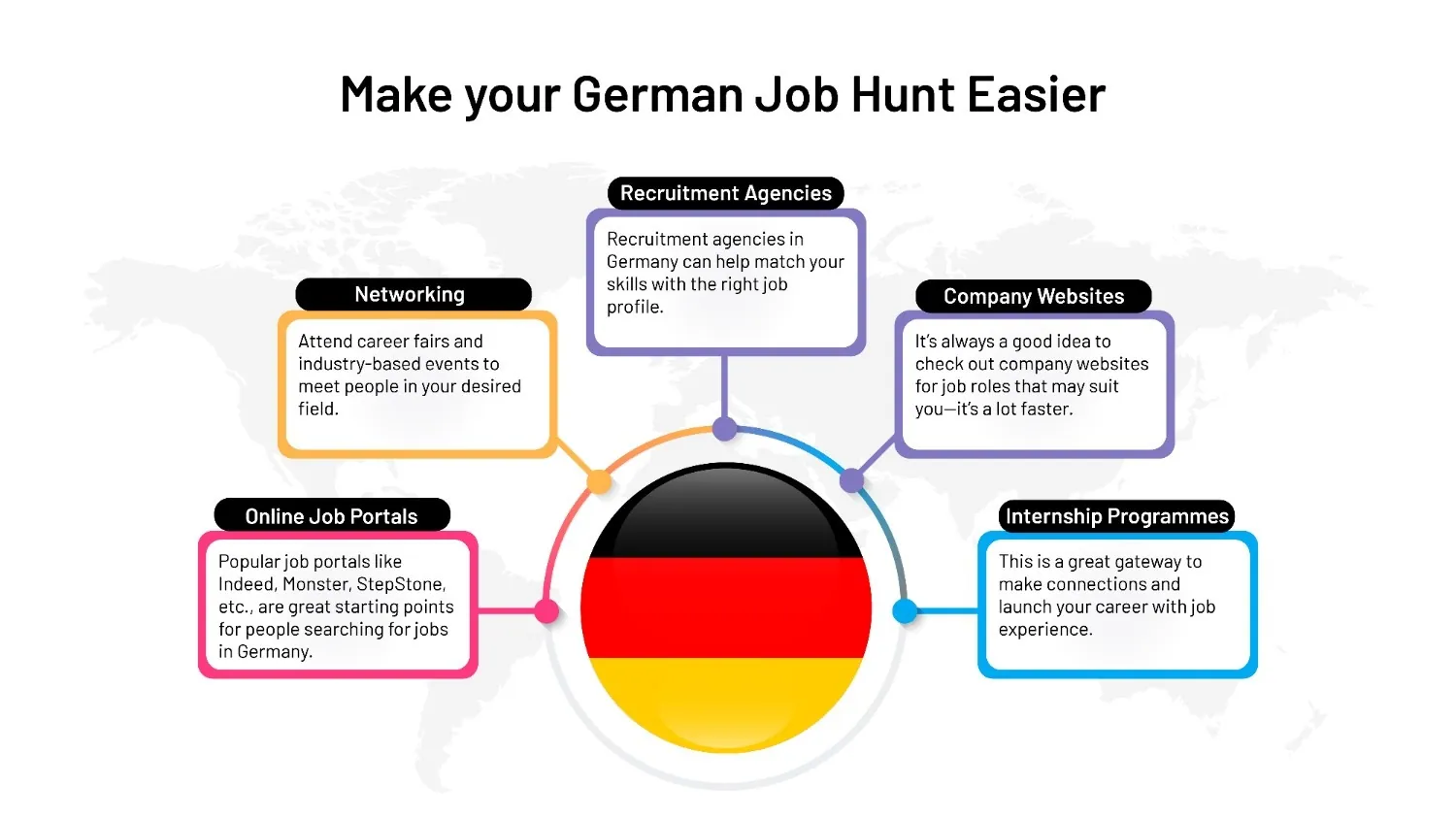
What to do After Obtaining an Opportunity Card

The road to Germany can be complicated without the right guidance. However, for many students who are looking for an alternative path with fewer obstacles, the Opportunity Card is a great route to your dream life in Germany.
The opportunity card is a unique opportunity that can fast-track your road to settling in Germany, so if you are a student or working professional with their sights set on Europe, the German Chancenkarte (opportunity card) is a great option.
You might now be wondering what happens after you get the opportunity card—there is a lot we can talk about when it comes to your journey to Germany and your life here. This blog will go into detail on the many aspects of German living.
If you are still considering or looking to learn how to get the opportunity card in Germany, you can check out more details in our blog about applying for the German Opportunity Card.
How to Integrate into German Society
1. Integration Courses: Learning the German Language
The first step to integrating into the German environment is learning the German language. You can do this via an integration course that will teach you how to make your way through the different aspects of daily life in Germany.

German Integrated Course coverage
This is compulsory for individuals whose German proficiency is not adequate for basic communication within the country. Integration courses will take you through the different areas of daily life, including:
- Shopping and trade
- Work and career
- Basic training and beyond
- Leisure time and interactions in social settings
- Media use
- Housing
- Raising children
The integration course is designed so that individuals become well-rounded in assimilating to German culture.
The course also includes an orientation portion that will take you through various cultural, legal and historical aspects of Germany, such as:
- German history, legal system and culture
- Rights & obligations in Germany
- Community life and forms
German Integrated Course Breakdown
You might now be wondering how long these integration courses last. There are many variations of the integration course, and they differ based on the individual’s needs. They can be roughly divided as follows:
- General Integration course – 700 lesson units
- Special Courses – Can extend to 1000 lesson units.
- Fast-track course – 430 lesson units
German Integrated Course Fees
The integrated course fee is payable per teaching unit. If you register for the course after 1 August 2022, each unit of the course is chargeable at 2.29 EUR per teaching unit.
For example, If you enrol in the General Integration course—which consists of 700 teaching units, the full course will cost 1603 EUR in total.
2. Finding a Job in Germany
Landing a job in Germany is your next stop for integration into the community. Germany is known for its low unemployment rate—it is also an industrial hub with many large corporations eagerly looking for capable individuals.
If you are wondering where to start looking for your job after Chancenkarte in Germany, then here are a few options for you to start your search.
| Online Job Portals Popular job portals like Indeed, Monster, StepStone, etc., are great starting points for people searching for jobs in Germany. These portals host a variety of job listings from all across Germany. |
Networking This is also a key element of doing a complete job search in Germany. You can attend career fairs and industry-based events to meet people in your desired field. Be on the lookout for great chances to network. |
| Recruitment Agencies These agencies specialise in helping candidates find the right job with the right employers. Recruitment agencies in Germany can help match your skills with the right job profile. |
Company Websites Companies often run their own career portals from their websites. It’s always a good idea to check out company websites for job roles that may suit you—it’s a lot faster. |
| Internship Programmes Keep an eye out for interesting internship opportunities at great companies. This is a great gateway to make connections and launch your career with job experience. |
N/A |
Navigating Legal and Administrative Requirements
1. Residential Address Registration
All who live in Germany are required to follow all legal requirements and legislation during their stay within the country—that is especially true for Indian immigrants who come by way of the Opportunity card visa in Germany,
When you move to Germany, you need to find a residence and register it via the Anmeldung process. The Anmeldung is the process for registering your residential address in Germany.
Once you move into a new address in Germany, the law dictates that you must complete the Anmeldung procedure within 2 weeks of the move—This doesn’t apply if your stay is going to be less than 3 months in duration.
You can complete your Anmeldung at the local Citizens office after your arrival in Germany. The major cities are:
- Munich
- Berlin
- Frankfurt
- Hamburg
- Cologne
- Stuttgart
Why you need the Anmeldung in Germany
You might be wondering why you need to file the Anmeldung in Germany. Here are the major reasons why:
- It is a legal prerequisite to live in Germany.
- Anmeldung is needed to obtain the address registration certificate—known as the Anmeldebestätigung.
- Anmeldebestätigung is needed to apply for a German visa, open certain German bank accounts, get a phone or internet plan, etc.
- Anmeldung is needed to obtain your German tax ID as well.
2. German Health Insurance
Another requisite for living well in Germany is health insurance. As an immigrant, you are entitled to equal, comprehensive healthcare that is offered to German citizens and EU citizens.
Therefore, you can avail yourself of all German healthcare services, from public to private, with no limits or restrictions. However, in order to do so, you are required to obtain insurance during your stay in Germany.
How to register for German Health Insurance
- Step 1: Complete your Anmeldung procedure at the local registration office.
- Step 2: Choose a health insurance provider (Krankenkasse) and go through the application procedure for membership.
- Step 3: Receive the health insurance card from your provider (Gesundheitskarte)—this is needed to access all health services.
Coverage and Accessibility of German Health Insurance
- If you are working but earning below 66,000 EUR per annum, you will need compulsory registration in the GKV system (Public Healthcare).
- If you earn more than 66,000 EUR per annum, are self-employed, or work as a civil servant—you can opt for private insurance (PKV).
3. Banking in Germany
The German Banking System is composed of hundreds of stable banking companies. Banks in Germany are of many types:
- Private commercial banks: Deutsche Bank, Commerzbank, KfW, etc.
- International banks: Banco Santander, Barclays, Citibank, etc.
- Savings banks: Sparkassen and Landesbanken
- Cooperative Banks: ranging from local cooperative banks to PSD-banks and Sparda banks
- Online banks: N26, Bunq, Wise, etc.
Opening a Bank account in Germany
Opening a German bank account is a daily simple process. Once you have a bank in mind, you can easily open an account after submitting the following documents:
- Passport or ID document
- Proof of Address (Meldebescheinigung)
- A valid German visa
- Employment proof / Student status proof
- A minimum initial deposit
4. Utilities in Germany
During your stay in Germany, your residence cost will also include various utility charges such as rent, electricity, phone lines, etc. It is important to have a general idea of how utility expenses work in Germany in order to be fully prepared to stay and work there.
Cold Rent vs. Warm Rent
Cold rent (Kaltmiete) is known as basic rent. It is a flat rate that is based on the residence in question.
Warm Rent (Warmmiete) consists of cold rent plus additional costs and service charges.
Additional Costs (Nebenkosten)
- Insurance
- Lighting
- Land tax (Grundsteuer)
- Water costs
- Elevator
- Garden maintenance
- Communal laundry facilities
- Refuse collection
- Cleaning of halls, stairwells, and communal areas
- Caretaker
- Satellite TV antenna or broadband cables
Anything that doesn’t qualify as Nebenkosten will be considered as separate utilities or payments that don’t form part of rent.
Energy Providers in Germany
You are free to choose from the many energy (gas and electricity) providers in Germany. Energy providers in Germany include:
- MaxEnergy
- Ostrom
- Entega
- NaturStrom
- Yello
- Tibber
- Badenova
Water Provides in Germany
The water grid in Germany is available for public use. Therefore, your water costs will be attributed to whichever company is prevalent in providing water in your region. The most prevalent companies are listed below:
| Company | Area |
|---|---|
| Berliner Wasserbetriebe | Berlin |
| Stadtwerke München GmbH | Munich |
| RheinEnergie | Cologne |
| Hamburg Wasser | Hamburg |
| Mainova AG | Frankfurt |
| Stadtwerke Düsseldorf AG | Düsseldorf |
Internet Providers in Germany
Germany is known for having some of the slowest internet speeds in Europe. Most users still depend on a DSL connection. However, some internet providers in Germany do provide faster internet speeds via fibre optic connections. The most popular internet companies in Germany are:
- Vodafone
- 1&1
- Telekom
- Easy
- PYUR
- O2
Conclusion
Receiving your Opportunity Card (Chancenkarte) is just the beginning of an exciting journey to Germany.
By focusing on integration through language courses, understanding the job market, networking, and navigating legal requirements, you’ll set yourself up for success.
Remember to take the time to explore your new home, manage your personal and professional responsibilities, and enjoy your experiences in this vibrant country.
With these next steps, you are well on your way to making the most of your opportunities in Germany. Stay proactive, stay informed, and embrace the exciting changes ahead!.

